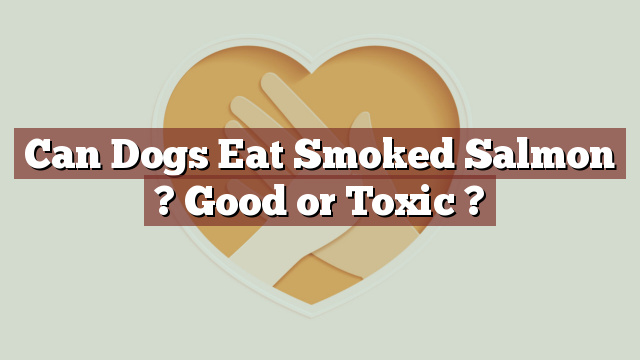Can Dogs Eat Smoked Salmon? Good or Toxic?
Knowing which foods are safe and appropriate for our canine companions is crucial for their overall health and well-being. One food that often raises questions among dog owners is smoked salmon. In this article, we will explore the nutritional value of smoked salmon for dogs, discuss whether it is safe or toxic for them, and highlight any potential risks or benefits. Additionally, we will provide guidance on what to do if your dog consumes smoked salmon.
Nutritional Value of Smoked Salmon for Dogs
Smoked salmon is a type of fish that has been cured and smoked, resulting in a flavorful and often sought-after delicacy. It is rich in several essential nutrients that are beneficial for both humans and dogs. Smoked salmon is an excellent source of high-quality protein, omega-3 fatty acids, vitamins D and B12, and minerals such as selenium and potassium. These nutrients play a vital role in maintaining a dog’s overall health, promoting a healthy coat and skin, supporting brain function, and boosting their immune system.
Can Dogs Eat Smoked Salmon? Is it Safe or Toxic?
While dogs can technically eat smoked salmon, it is not recommended to make it a regular part of their diet. The main concern with feeding smoked salmon to dogs lies in its preparation and potential seasoning. Most commercially available smoked salmon products are often high in sodium and may contain additional ingredients such as spices, garlic, onion, or seasoning blends that can be harmful to dogs. These additives can cause digestive upset, toxic reactions, or even lead to conditions like pancreatitis.
Furthermore, consuming raw or undercooked salmon can put dogs at risk of ingesting harmful bacteria like Salmonella or parasites like the tapeworm. These pathogens can cause severe gastrointestinal issues, including vomiting, diarrhea, and dehydration.
Potential Risks or Benefits of Feeding Dogs Smoked Salmon
While smoked salmon can provide some nutritional benefits to dogs, it is important to consider the potential risks associated with its consumption. The high sodium content in smoked salmon can lead to increased thirst and may negatively impact dogs with certain health conditions, such as heart or kidney problems. Additionally, the seasoning and additives in smoked salmon products can cause allergic reactions in some dogs, leading to symptoms like itching, skin inflammation, or gastrointestinal distress.
On the other hand, the omega-3 fatty acids found in salmon can have anti-inflammatory properties, potentially benefiting dogs with conditions like arthritis or allergies. However, there are safer and more controlled ways to incorporate omega-3 fatty acids into a dog’s diet, such as through fish oil supplements specifically formulated for pets.
What to Do if Your Dog Eats Smoked Salmon
If your dog accidentally consumes smoked salmon, it is essential to monitor them closely for any signs of adverse reactions or digestive upset. If your dog shows any concerning symptoms, such as vomiting, diarrhea, abdominal pain, or lethargy, it is crucial to seek veterinary care immediately. In cases where your dog has consumed a significant amount or if you suspect the salmon was spoiled or contaminated, it is advisable to contact your veterinarian promptly for guidance.
Conclusion: Smoked Salmon – A Tasty Treat with Caution
In conclusion, while dogs can technically eat smoked salmon, it is not recommended to feed it to them regularly. The potential risks associated with its consumption, such as seasoning additives, high sodium content, bacterial contamination, and the risk of allergic reactions, outweigh the potential benefits. As responsible dog owners, it is essential to prioritize their health and well-being by choosing safe and appropriate food options for them. If you have any concerns or questions regarding your dog’s diet or if they have consumed smoked salmon, always consult with your veterinarian for professional advice tailored to your furry friend’s specific needs.
Thank you for investing your time in exploring [page_title] on Can-Eat.org. Our goal is to provide readers like you with thorough and reliable information about various dietary topics. Each article, including [page_title], stems from diligent research and a passion for understanding the nuances of our food choices. We believe that knowledge is a vital step towards making informed and healthy decisions. However, while "[page_title]" sheds light on its specific topic, it's crucial to remember that everyone's body reacts differently to foods and dietary changes. What might be beneficial for one person could have different effects on another. Before you consider integrating suggestions or insights from "[page_title]" into your diet, it's always wise to consult with a nutritionist or healthcare professional. Their specialized knowledge ensures that you're making choices best suited to your individual health needs. As you navigate [page_title], be mindful of potential allergies, intolerances, or unique dietary requirements you may have. No singular article can capture the vast diversity of human health, and individualized guidance is invaluable. The content provided in [page_title] serves as a general guide. It is not, by any means, a substitute for personalized medical or nutritional advice. Your health should always be the top priority, and professional guidance is the best path forward. In your journey towards a balanced and nutritious lifestyle, we hope that [page_title] serves as a helpful stepping stone. Remember, informed decisions lead to healthier outcomes. Thank you for trusting Can-Eat.org. Continue exploring, learning, and prioritizing your health. Cheers to a well-informed and healthier future!

